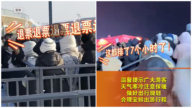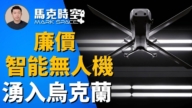【新唐人2014年08月19日訊】「農民日常飲用『一杯乾淨水』,起碼免於受到最直接健康損害的最基本要求,也只是一個奢望。」這是中國非政府組織「創綠中心」,在日前發表的報告中的一句話。中國為經濟增長付出的環境成本前所未有,然而越治理卻越污染。我們訪問到在國內多年擔任環境管理官員的專家,為您揭示不為一般人所知的原因。
「創綠中心」的「一杯乾淨水項目」,到去年末為止,共調研了大陸96個村莊和學校。在這份報告中,他們特選72個村莊和6個農村地區的學校進行分析,發現農村飲水環境令人擔憂。
報告顯示,調研村莊一半以上有飲水問題,地表水水源變的越來越少,隨著水源受到污染問題日益嚴重,而民眾的飲水方法,基本是不經處理。有些村莊村民多發口腔疾病、結石疾病、皮膚病等,也不能排除與飲用水水質差有關聯。
而調研村莊飲水的最主要污染源,是工業污染,以及養殖業、垃圾場等。另外,由於飲水管道沒有維護等原因,農村地區小學的孩子們直接喝生水,有很大風險。
實際上,飲用水安全問題,還不只是在農村,去年就有報導說,「中國一半城市的飲用水不合格」。今年3月,環保部又說,「中國2.8億居民使用不安全用水」。中國的水污染問題為甚麼長期治理,卻越治理,越污染呢?
在國內擔任多年環境管理官員的高博士,向《新唐人》揭示了一個鮮為人知的環保體制上原因。
前中國環境管理官員高博士:「其實中國的環境保護的目地,開始就是不對的。不是為了真正的人的生活,而是為了秩序穩定的經濟發展。那麼在治理手段上,它也是同樣考慮經濟發展的問題。所以它在治理過程當中,有一個『徵收排污費』的問題。實際上這個『徵收排污費』,不是在給企業增加壓力,不能夠排放污染物,而是政府在賣環境資源。環境保護部門,在這個過程當中,它在掙錢。」
「創綠中心」的報告,也建議地方政府,應當改變「重政績」為「重質量」,做好勘探、設計以及工程監理工作。高博士披露,中共對地方官員的考核標準中,的確有一個「環境項目」,而且還是「一票否決權」。也就是說,即使其他項目都達到標準,只要「環境」這一票不合格,其他成績都算零。
高博士:「我們搞環境保護的時候,實際監測之後,實際上這個城市的環境質量很差。但是為了考慮到這個城市的考核,市長的考核,我們另做一套數據。那是達到標準的數據。然後把這個數據交給往上,往省,往國家上報。這樣的話,表面上看起來,這個城市,這個農村,這個地區的環境,是每年每年,越來越變好。」
高博士指出,不僅環保數據是「內行看門道」,連政府治理排污企業的數據,也是。例如,甘肅省曾經由於治理排污,關閉了100多家企業。
高博士:「100多戶,但是都是小型的企業。甚至有些根本是掛著名字,實際上沒有生產的企業,關掉了。那個整個100多個企業加起來,都沒有甘肅省一個叫『白銀有限公司』的企業,它污染重。那麼為甚麼不關閉這個工廠呢?因為這個工廠,它是整個縣的納稅大戶。」
環保部門靠環保賺錢;地方官員靠假數據搏政績﹔政府所謂「大力治理」,結果卻只是數字「看起來很美」。
高博士:「按照現在的中國環境保護的方法,或者中國現在整個國家的運行機制的話,它是污染治理不了。因為它這個整個國家,以經濟發展為主這個不改變的話,它是不可能的。所以要想改變這個狀態,整個國家的運行機制都得改過來,還是要以人為主才能行。」
「以人為本」,就是飲用水不再只是數據過關。浩浩長江漂著死豬,監測數據都能達到飲用水標準,但高博士說,這樣的水,不能喝。
採訪編輯/尚燕 後製/李勇
It’s A Luxury to Drink a Glass of Clean Water
“Farmers’ fundamental need to drink a glass of clean
water in their daily lives so as to get rid of the most direct
damage to their health remain luxurious wishes" is a sentence
in a report recently published by NGO Greenovation Hub China.
China has paid an unprecedented environmental cost for its
economic growth, but the more it does, the more serious
the pollution is.
We have interviewed some experts who have dealt with the
environmental governance in China for years, and they
reveal some reasons that are unknown to the average person.
As of the end of last year, Greenovation Hub’s One Glass of
Clean Water Project has conducted a survey in a total of 96
villages and schools in China.
In this report, 72 villages and six schools in rural areas were
selected for analysis, and they found that the drinking water
environment in farming villages is worrisome.
The report shows that more than half of the villages surveyed
have drinking water problems.
The sources of surface water have become less and less.
Though the pollution in the sources has become worse and worse,
the drinking water used by the general public is basically
not treated.
In some villages, most villagers have oral diseases, stone disease,
skin diseases, etc.
We cannot rule out the possibility that they are linked
to the poor quality of drinking water.
The main sources of drinking water contamination in the
villages surveyed are industrial pollution, garbage dumps,
aquaculture, etc.
In addition, due to a lack of maintenance on drinking water
pipelines and other reasons, it’s very risky for elementary
school pupils in rural areas to drink unboiled water directly.
In fact, the problems with drinking water safety do not exist
in rural areas alone.
It was reported last year that half of the major cities in China
failed to meet drinking water standards.
In March this year, the Ministry of Environmental Protection
indicated “Over 280 million people in China are using unsafe
drinking water."
Then why are China’s water pollution problems getting more
and more serious though they have been dealt with for a long time?
Dr. Gao, a former official who worked on environmental
management in China for many years, revealed an
environmental institutional reason to NTDTV.
Dr. Gao: “In fact, the objectives of China’s environmental
protection were wrong at the outset.
They were not really for people’s lives, but for stable economic
development.
The management approaches they took into consideration
were also focused on economic development issues.
As a result, during the process of management, there was a
problem of the pollution charge.
In fact, this pollution charge was not intended to pressure
enterprises not to discharge pollutants.
It was for the government to sell environmental resources,
and it was for environmental protection agencies
to make money during the process."
In its report, Greenovation Hub also suggested that local
government should transform their performance-oriented
mentality into quality-oriented mentality so as to do a good job
in assessment, design and construction supervision.
Dr. Gao disclosed that there is surely an item for environmental
protection in Chinese evaluation criteria for local government
officials, and it’s an “absolute veto."
In other words, even if other items are up to par, their score
would be considered zero so long as the environmental
protection item failed.
Dr. Gao: “When dealing with environmental protection affairs,
though the monitored environmental quality of a city was
very poor, we made up another set of data that were up to
standards, as we took into account the evaluation of the city
and that of the mayor.
Then we submitted the data to our superior authorities,
including the provincial and central governments.
By doing so, the environment protection in this city, village
or region would seem to be better and better
every year on the surface."
Dr. Gao pointed out that not only did the data on environmental
protection have problems, but even those on enterprises that
emitted pollutants were also falsified.
For example, the number of factories that were shut down
due to sewage treatment problems in Gansu Province was once
as high as over 100.
Dr. Gao: “All of these 100-plus factories were small businesses,
and some of them were even simply virtual companies without
any production records.
The aggregate pollution of these 100-plus factories was not
as serious as that of a company in Gansu Province by the name
of Baiyin Nonferrous Metals Company.
Then why was this plant not closed?
It was because this plant is the biggest taxpayer in the county."
Environmental protection agencies make money
by mean of environmental protection.
Local government officials gain their performance evaluation
by falsified data.
The government’s so-called “strong governance" turns out
to be nothing but falsified data that looks good.
Dr. Gao: “Based on China’s existing environmental protection
approaches or its national operation mechanism, it’s impossible
to deal with the pollution.
As long as the national mentality of focusing everything on
economic development is not changed, the situation
cannot be changed.
So, if we want to change the situation, the operation mechanism
of the entire country has to be changed thoroughly.
After all, people should be the focus of national policies"
In terms of “people-oriented" concept, the data on drinking
water can no longer be falsified to pass the evaluation criteria.
If the vast Yangtze River is still floating with dead pigs,
but the data showed the water met the standard for drinking,
Dr. Gao exclaimed, “how can this kind of water be drinkable?"
Interview & Edit/ShangYan Post-Production/LiYong






























